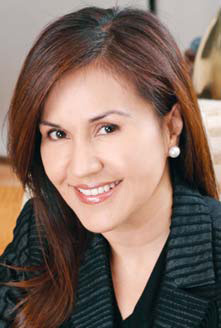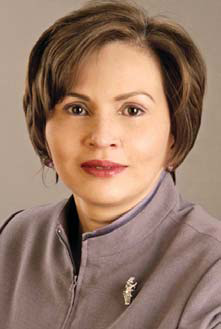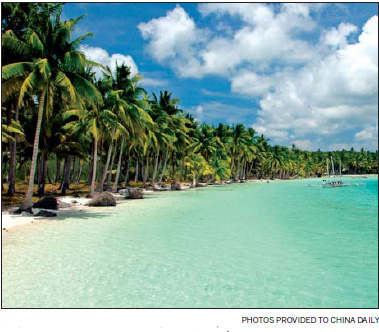Tourism and real estate build up the economy
Updated: 2011-08-03 08:40
(China Daily)
|
|||||||||||
|
President and CEO, Jaka Investments Corporation, Katrina Ponce Enrile |
|
President and CEO, Makati Medical Center, Rosalie Montenegro |
|
Beachfront property, Punagis Point, Palawan. |

Global connections are growing in tourism, healthcare and processed fruit sales
Slated as one of the future pillars of the Filipino economy, tourism has grown increasingly important in recent years. A new tourism act has been introduced, which aims to give private investors more incentives to invest in the country and invent a new branding for the Philippines.
Secretary of Tourism at the Department of Tourism, Alberto Lim, takes up the story: "We need to project the country's many treasures, especially its people, who are one of our greatest resources as a very welcoming country. We have to develop and improve our product, we have natural beauty: sand, and sun, beach, culture and history."
With a growing number of Chinese visitors flocking to the Philippines' shores - around 300,000 visited in 2009 - the tourism chief is determined to develop this market.
"First we have to reduce the red tape within the visa system," he said. "Secondly, there must be an increase in flights to and from China, in order to offer more choices of timetable and airfares. China could be a much bigger market if these two challenges were addressed."
Voted the most popular leisure destination of Asia two years ago by the World Travel Market, and having showcased its attractions successfully at the Shanghai World Expo in 2010, numbers of visitors have increased but the challenge of accessibility remains, as Lim explained:
"We are implementing an open sky policy within the Asian countries, and of course, we want to attract all the big markets such as China and India. We are just touching the surface of China, we have the potential to attract many more visitors, including Hong Kong. We get twice as many visitors from South Korea, which is a much smaller market, because we have a higher number of flights to and from there."
He continued: "I am probably the first secretary of tourism in this country with experience in the private sector and am dedicated to promoting a good product. I know how to develop the product first and market it later. We can make more of a difference in this administration toward the development of tourism for this country.
"We want to increase the numbers by 15 percent within five years; in order to do this, we have to have an extraordinary effect in infrastructure, ministers, policy, local community development, standard expections and luck.
"Many Filipinos have Chinese roots, so there is a cultural connection but our culture is also influenced by Western civilizations, which makes us unique in Asia. We therefore invite people to come and see the influence of their own culture, but also the differences from the Spanish culture. We guarantee they will be surprised and return!"
Beautifying the country
Meanwhile, at JAKA Investments Corp, President and CEO Katrina Ponce Enrile is determined to contribute to real estate and tourism products with her forward thinking company.
"We have the most beautiful beachfront properties in the country," she said "and we would like to develop them with a responsible tourism, environmentally sustainable and with a long-term vision.
"Real estate is a very mutable market and when we started in 1995, the trend was flagship projects, with everyone wanting to develop extensive, massive projects. After the financial crisis in 1997, however, we had to be more realistic with our visions, goals and aspirations.
"It was a difficult time for us, but we managed to fund all our projects internally; we finished our golf course, we had a joint venture for our residential side and began slowly selling all units for a condotel. We remember 1997 and we know exactly what Europe is going through.
"We were able to lower our expectations to continue on the path, the market for high-end properties exists, so you have to choose your niche. The goal should always be on differentiating yourself, how to be similar to the needs, but different on the approach so you are noticeable. Many trends come and go, such as minimalist, so you have to stand back and think: will it last? Sometimes the answer is no, other times it is a maybe, and you have to find out what will make your development be sustainable for years to come."
The Jaka formula, which has been to select beautiful properties that have nice views and are in accessible locations has to date been a successful one.
"Responsible tourism is all about not overworking or overloading a property just because it is beautiful and because you want a quick profit, to give back and wait. It is impossible to manufacture land, and if you own a beautiful property and protect it and develop it in such a way that it will just be enough, you will appreciate the long-term benefits.
"Everything we do has a social impact and all of us share a corporate social responsibility, including our shareholders. It is a constant balance and we are always there, before and after natural catastrophes, education, health-wise, employment wise. It is 'give and take' and since our manpower is local, we understand the issues of the community.
"I am proud to be Filipino. I think we are an underrated nation, people abroad think of us as domestic helpers and services, but we are more than that. We are a country of people that are very giving and hospitable, truly caring for one another. That is the nature of the Filipino and that is what we have in our company. I run the company as my family and I genuinely care for each and every one of my executives and workers.
"My door is always open to them. I do not see myself as a CEO but someone who is there to guide them along. I never studied business, my background is in political science.
"I would invite potential partners to come and see our country for themselves. Ideally, they should share our vision, and trust us to control the business as we are insiders in the market, while they could provide the technology and access to the international market. We are a local market with an immense potential to grow."
Makati Medical Center
In the business of delivering exceptional healthcare facilities - and with its sights set on becoming a key player in medical tourism within the Asia Pacific region - last year marked another year of progress for premier medical institution Makati Medical Center (MakatiMed) in its continued efforts in achieving a renaissance.
Focused on strengthening its critical infrastructure, MakatiMed is boosting its people, facilities, medical equipment, IT network, processes, and financials to face the challenges brought on by modern healthcare.
Amid a backdrop of unfolding technological advancements, developments in medical science and research, better informed, and therefore more discriminating patients, as well as the rapid rise of medical tourism, MakatiMed is strategically using its sustained profitability and plowing funds back to the hospital to enhance its medical capability and match this to the changing realities of the industry.
It all sounds terribly technical, but the country's leading hospital (also known as the 'Hospital with a Heart') is following this direction without losing sight of what it considers its foremost priority - delivering compassionate care to its patients. The steps that MakatiMed has taken, starting from the construction of its new building down to its latest equipment, was done in order to build a patient-centered culture that provides a total and satisfying end-to-end experience for every individual passing through the hospital's doors.
"At MakatiMed, we see beyond age, gender, statistics or pulse rates. We don't see patients, we see lives - and that's our main motivation for pushing these changes," said MakatiMed President and CEO Rosalie Montenegro.
"What we're striving for is to be a hospital that has, in equal parts, the know-how, the facilities and the equipment to address current and emerging trends in medical treatment, technology and delivery, and the most proficient physicians and personnel to utilize these to provide the best service and the most compassionate care."
The plan has been put in place and is being filtered into all aspects of the medical institution. MakatiMed is harmonizing the medical and corporate sectors of its organization to ensure the implementation of global best practices in operations and service management.
Going global
Facilities are being beefed up, with the ongoing renovation of the hospital building to complement the new tower - which houses nine Centers of Excellence and shifts the focus from fragmentation to integration of medical care - and transform the entirety into a warm, friendly yet totally modern healthcare complex. These serve the health and wellness of both domestic and global patients as MakatiMed positions itself to go into the burgeoning medical tourism industry in Asia Pacific.
The hospital has started investing in new medical equipment to support doctors in their practice. It has broken away from the old paradigm and is harnessing the power and efficiency of ICT (information and communications technology) to create enhanced diagnostics and patient care, and a pleasant and convenient patient experience - from admission all the way to discharge.
Telecommunications are being upgraded to improve accessibility for patients, in order to promote not only face-to-face patient encounters but also remote access for their added convenience.
As part of the medical institution's rich heritage, its nursing school (a major source of the hospital's nurses and other healthcare staff) has been re-branded as the Makati Medical Center College of Nursing. It has implemented a new curriculum, forged international affiliations and will be relocated to new premises. Lastly, the hospital is continuously finding ways to help the community in which it operates via the thriving Hospital Service Program (HSP) and the soon to be revitalized MakatiMed Foundation.
Montenegro emphasized that "the amalgamation of all these critical infrastructure components will pave the way for MakatiMed to become what it envisions itself to be -the leader in total patient healthcare. Our bottom line is that we aren't here to just treat patients, we are here to help lives get better."
Food for thought
Another global reaching name, Profood International Corp has grown from a small local provider of processed fruit products to be the standard bearer of Philippine's exceptional quality food exports around the world.
In fact, almost 90 percent of the company's produce is exported to 40 countries, with 60 percent of all gross income going back to the rural areas. President Justin Uy is proud of the fact the company has improved the living standards of the farmers.
"In 1982, a kilo of fresh mango cost only 1 peso," he said. "Today, it is 25 times that amount. We have been able to penetrate all markets over the last 30 years and are the leaders in the US and Japan."
Since import tariffs were removed last year, the Cebu-based operation has also been celebrating its entry into the Chinese market.
"We are targeting the progressive, coastal cities in southern China and the high-end customer as our product is still expensive because of the cost of raw materials," Uy said.
"But we believe the same will happen in China as happened in the US and Canada; they now make up half of our business because they have the purchasing power."
The company now boasts four manufacturing plants across the country and each one has multi-factories inside.
"We are investing in real estate now," Uy said. We have opened a shopping mall and will plow everything back into the Philippines."
(China Daily 08/03/2011 page18)


